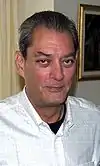Smoke (film)
Smoke is a 1995 American independent film by Wayne Wang and Paul Auster. The original story was written by Paul Auster, who also wrote the screenplay. The film was produced by Greg Johnson, Peter Newman, Kenzo Horikoshi, and Hisami Kuroiwa. Among others, it features Harvey Keitel, William Hurt, Stockard Channing, Harold Perrineau Jr., and Forest Whitaker.
| Smoke | |
|---|---|
.jpg.webp) Theatrical release poster | |
| Directed by | Wayne Wang |
| Produced by | Greg Johnson Peter Newman Kenzo Horikoshi Hisami Kuroiwa |
| Written by | Paul Auster |
| Starring | |
| Music by | Rachel Portman |
| Cinematography | Adam Holender |
| Edited by | Maysie Hoy |
Production company | |
| Distributed by | Miramax Films |
Release date |
|
Running time | 112 minutes |
| Country | United States Germany Japan |
| Language | English |
| Budget | $7 million |
| Box office | $38 million |
Plot
The film follows the lives of multiple characters, all of whom are connected via their patronage of a small Brooklyn tobacconist store managed by Auggie (Harvey Keitel). Brooklyn Cigar Co. was located on the corner of 16th Street and Prospect Park West.
Auggie takes a photograph of the store from across the street at 8:00am every morning. A recently-widowed writer Paul Benjamin (William Hurt) sees his wife in one of the pictures, and breaks down. Later, he is saved from being run down by a truck by a young black man named Rashid (Harold Perrineau Jr.), whom he invites to stay in his apartment.
Rashid accepts, saying he was recognised by robbers and his life is in danger. He tracks his father (Forest Whitaker) down to a small-town gas station, which he sketches. His father, not recognising him, befriends him, and Rashid gives his name as Paul Benjamin.
Paul finds $5000 that Rashid has stashed in the apartment. Paul tracks Rashid down, and introduces himself to his father, who comments that Rashid and him share a name, and calls him out. Rashid admits that his real name is Thomas Jefferson Cole, which his father also has difficulty believing, as it is the name of his son.
Rashid is hired to work at the tobacconist, but ruins a shipment of cigars when the sink overflows. He gives Auggie the $5000 to keep his job.
Another thread has Auggie's old girlfriend (Stockard Channing) re-visit, asking for money for Felicity (Ashley Judd), who she implies is his daughter. Auggie later gives her the same $5000.
The many story lines never really connect, except through Auggie.
At the end of the film Auggie tells Paul a tender story about spending Christmas with a blind grandmother who at first thinks, and then pretends, he is her grandson. The story is based on writer Paul Auster's piece "Auggie Wren's Christmas Story", published in The New York Times on Christmas day, 1990. During and after the closing credits, Auggie's story is enacted in a poignant black-and-white sequence to the soundtrack of Tom Waits's Innocent When You Dream.
Cast
- Giancarlo Esposito as OTB Man #1, Tommy Finelli
- José Zúñiga as OTB Man #2, Jerry
- Harvey Keitel as Augustus 'Auggie' Wren
- Jared Harris as Jimmy Rose
- William Hurt as Paul Benjamin
- Daniel Auster as Book Thief
- Harold Perrineau as Thomas 'Rashid' Cole (as Harold Perrineau Jr.)
- Deirdre O'Connell as Sue the Waitress
- Victor Argo as Vinnie
- Michelle Hurst as Aunt Em
- Forest Whitaker as Cyrus Cole
- Erica Gimpel as Doreen Cole
- Stockard Channing as Ruby McNutt
- Ashley Judd as Felicity
- Malik Yoba as The Creeper
- Mary B. Ward as April Lee
- Clarice Taylor as Grandma Ethel
Reception
On Rotten Tomatoes the film has a rating of 93% based on 29 reviews.[2]
It earned $8 million in the United States and $30 million internationally.[3]
Awards
Won
- Silver Bear (Wayne Wang) 45th Berlin International Film Festival, 1995[4]
- Danish Film Critics Bodil Award for Best American Film, 1995
- German Film Award for Best Foreign Film, 1995
- MTV Movie Award for Best Sandwich in a Movie - Ham and Cheese Sandwich
- Independent Spirit Award for Best First Screenplay (Paul Auster), 1995
Nominated
- Stockard Channing - Best Supporting Actress - Screen Actors Guild
Sequel
The film was followed by Blue in the Face, a sequel of sorts that continues following a few of the characters and introduces several new ones.
Legacy
The character Augustus "Auggie" Wren (played by Harvey Keitel) is modelled after the real-life owner of Augie's Jazz Bar, which closed in 1998. When the establishment reopened in 1999, the new owners could not keep the former establishment's name. To honor its legacy, they named the new club after the 1995 film.[5][6][7]
References
- "NDF International Home". ndfinternational.com. Retrieved 2019-07-16.
- "Smoke". Rotten Tomatoes. Fandango Media.
- Liu, Sandra (2000). "Negotiating the Meaning of Access: Wayne Wang's Contingent Film Practice". Countervisions: Asian-American Film Criticism. Temple University Press. p. 96. ISBN 1-56639-775-8. For paperback: ISBN 1-56639-776-6.
- "Berlinale: 1995 Prize Winners". berlinale.de. Retrieved 2011-12-31.
- "All That Jazz: Smoke Jazz and Supper Club, Harlem". Voyage.tv. Archived from the original on January 7, 2011. Retrieved June 30, 2011.
- "Smoke Jazz & Supper Club-Lounge: Great Venue In New York". allyourjazz.com. January 13, 2009. Archived from the original on July 13, 2011. Retrieved June 30, 2011.
- "NY Times Critic's Pick: Smoke Jazz & Supper Club-Lounge". NYTimes.com. Retrieved June 30, 2011.
